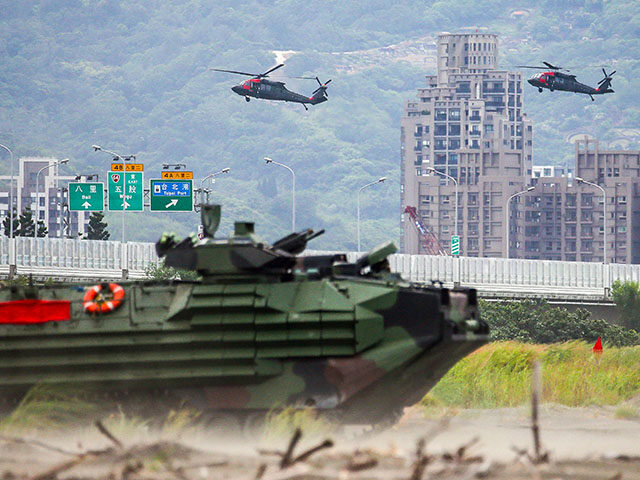Taiwanese Embrace Board Game About Fending Off Chinese Invasion
 I-Hwa Cheng/Bloomberg via Getty Images
I-Hwa Cheng/Bloomberg via Getty Images
Taiwan’s growing obsession with envisioning a Chinese invasion will soon extend to the realm of board games, as a crowdfunding drive raised $100,000 for a game called “2045” that will allow players to simulate a Chinese attack 20 years in the future.
The game uses many conventions common to modern board games, including a mix of cards and tokens to represent military and political forces and the tactics they employ. The players can become everything from Taiwanese government officials to criminal gangs and Chinese espionage agents.
Mizo Games founder KJ Chang told the Wall Street Journal (WSJ) on Thursday he chose the invasion landing sites on his game board by reading social media posts from real soldiers in the Chinese People’s Liberation Army.
“We can’t predict the future, but if a conflict is unavoidable, I hope this game gives people a chance to experience war on the tabletop before it reaches us,” Chang said.
In an interview with Taiwan News last month, Chang said he set the game 20 years in the future to give it a “cyberpunk” theme, and so that players could “distance” themselves from the simulated nightmare scenario.
Chang said one of his goals was to give players a means of understanding how Taiwanese society would respond to a devastating Chinese attack.
One method the game uses to accomplish this goal is randomly assigning roles to the players, which means they could end up playing a role that is “completely at odds with their personal positions.”
“It’s definitely not the case that players must defend Taiwan in this game, it’s every player for themselves,” Chang said.
Chang said in September he has offered all of Taiwan’s 113 legislators, including members of the governing Democratic Progressive Party (DPP) and the more pro-China opposition Kuomintang (KMT), a chance to play his game. He said many of them have accepted, along with former officials and members of the media.
Chang said the game was not intended to make a political statement, and he shares the hope of his players that “this will never happen, or that it only happens in a game.” He acknowledged that the provocative subject matter created some marketing problems, including other publishers refusing to share a booth with him at an international board game expo, and possible “shadowbans” of advertisements for “2045” on social media.
Chang noted that while most Taiwanese board games have components manufactured in China, Chinese companies refused to produce the board and pieces for “2045.” He said he has located a factory in New Taipei that is willing to manufacture the game.
Taiwanese culture has long preferred to avoid discussing or fictionalizing the long-feared Chinese invasion, but that seems to have changed rather abruptly over the past few years. The WSJ pointed to the Russian invasion of Ukraine in February 2022, and China’s belligerent military drills after former U.S. House Speaker Nancy Pelosi visited Taiwan in August 2022, as major reasons for the sea change in public opinion.
Taiwanese citizens, especially young people, seem increasingly obsessed with exploring the long-taboo subject of a Chinese invasion. Former soldier Liang Shao-hsien said his graphic novel Western Pacific War: The Invasion of Taiwan, originally published in 2018, saw a “sevenfold” sales increase after Pelosi’s visit and Beijing’s response.
The most curious cultural artifact to emerge from Taiwan’s new willingness to imagine a Chinese invasion is “Zero Day,” a ten-part television series that will not actually air until next year. In July, a 17-minute trailer for the show became an astonishing viral sensation, launching thousands of fiery social media arguments and bringing some of its viewers to tears.
Some more details of the plot of “Zero Day” have been revealed by its producers, as summarized by France’s Le Monde last week:
It is a day in March or April of an undefined year. Taiwan recently held its presidential election, and a democrat is preparing to succeed a liberal. In this season of political uncertainty, the sea currents are also favorable for the launch of a military incursion. Suddenly, the Chinese People’s Liberation Army announces that it lost contact with one of its aircraft, a Shaanxi Y-8, flying over the southern part of the Taiwan Strait. Under the pretext of searching the sea for any surviving airmen, China imposes a total blockade on the island, which is de facto independent but which Beijing considers to be one of its provinces.
Conscription orders reach young Taiwanese. On social media, fake news is rife, announcing that China already conquered some islets, quickly abandoned by the Taiwanese army, and that the president fled. Psychological warfare begins. While selling ice cream online, a Chinese influencer tells her followers: “Those who ask you to resist on the battlefield don’t give a damn about your lives,” urging the Taiwanese population to accept Beijing’s peace.
One interesting detail of “Zero Day” is that criminal gangs known as “triads” take the opportunity of the Chinese invasion to stage mass prison breaks and put together goon squads to collaborate with the Chinese. The “2045” board game also allows its players to take the role of a criminal gang leader.
Source link

